
Stomach bloating after meals can be incredibly uncomfortable.
Research shows that 10 to 25% of healthy people experience it to some degree, yet most don’t do anything about it
It’s even more common among those with gastrointestinal disorders, such as IBS.
Fortunately, diet changes alone can help to relieve or prevent most cases. This article explores what is scientifically shown to help stop bloating.
What Causes Stomach Bloating?
Stomach bloating is characterised by a strong feeling of pressure within the abdomen.
The term is often used interchangeably with dyspepsia (indigestion), stomach distention or water retention. These are separate issues, but they may occur at the same time as bloating.
It’s common in gastrointestinal disorders, especially irritable bowel syndrome (IBS).
However, it also occurs in the absence of other medical conditions
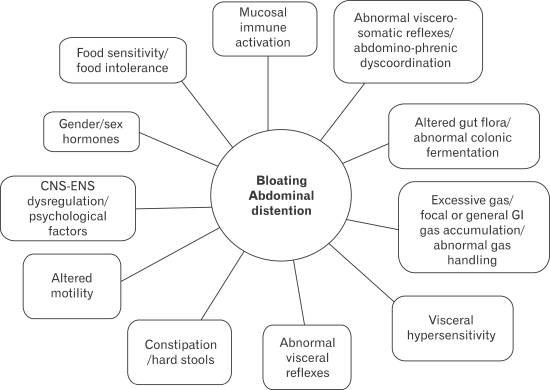
A comprehensive list of the proposed causes of bloating.
The exact causes of bloating vary from person to person, and sometimes between episodes.
But it’s typically the result of:
Abnormal gut bacteria
Unusually slow digestion
Abnormal abdominal muscle reflexes
Increased nerve perception of pain
Food sensitivities (either FODMAPs or food chemicals like histamine)
Psychological distress
Summary: Bloating is defined as strong abdomen pressure after meals. The causes vary by person and by episode.
- Treat IBS and FODMAPs Sensitivities
![]()
Remove FODMAPs to help with bloatingIrritable bowel syndrome is a common disorder that causes a variety of digestive symptoms.
Bloating is one of the most common symptoms of IBS, with more than 90% of IBS patients complaining of it.
For many, eliminating trigger foods in the diet relieves the problem, which are almost always FODMAPs.
In one study on IBS patients, 43 participants were prescribed a low FODMAP diet, while 39 volunteers continued a standard diet to act as the control. Both groups completed questionnaires about changes to their symptoms.
82% of patients in the low FODMAP group reported improvements in bloating, while just under half of the control group reported improvements. So there is a notable improvement.
To learn more about removing FODMAPs from your diet, click here.
Summary: Studies show that FODMAPs are a common trigger of bloating in those who are sensitive. Following a low FODMAP diet should be the first step if you have or suspect IBS.
- Probiotics Can Help Get Rid of Bloating
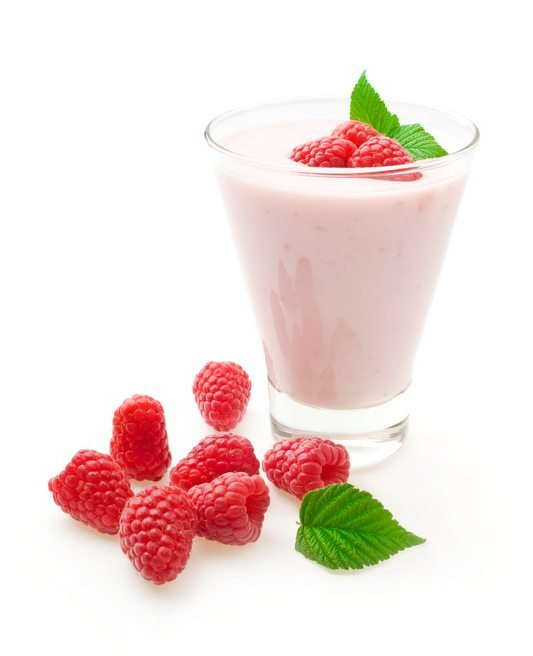
Probiotics Can Help Get Rid of BloatingProbiotics are beneficial bacteria found naturally in certain foods and supplements.
There is loads of evidence they can help with digestive health, especially bloating.
In a study of 122 IBS patients, a daily dose of Bifidobacterium bifidum significantly improved bloating and pain symptoms compared to placebo.
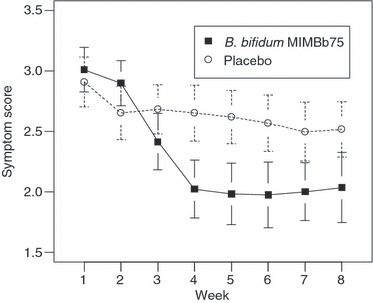
Comparison of B. bifidum and placebo on IBS symptoms measured by subjective global assessment (SGA) over 8 weeks. Lower score is better.
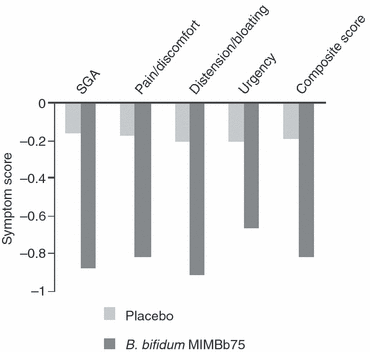
Comparison of change in IBS symptoms with B. bifidum vs. placebo before and after treatment. Lower score is better.
These results are supported by another trial that used a combination of strains for a 4-week period, one of which was also from the Bifidobacterium species.
Interestingly, it’s not uncommon for the placebo groups in these studies to experience digestive improvements. So there is certainly a placebo effect at play to some degree.
Note that only certain strains of probiotics at specific doses have so far shown to be useful for bloating, when taken for at least 4 weeks:
Lactobacillus acidophius and Bifidobacterium infantis at a dose of 1 x 1010 cfu per day.
Lactobacillus acidophilus plus Bifidobacterium lactis at a dose of 2 x 1011 cfu per day.
Bifidobacterium bifidum at a dose of 1 x 109 cfu per day.
Bifidobacterium lactis at a level of 1.25 x 1010 cfu per dose, plus a combination of Streptococcus thermophiles and Lactobacillus bulgaricus at 1.2 x 109 cfu per dose.
But there are also studies that have shown little benefit of probiotic supplements on bloating too, so there is still more to learn.
If you decide to try a probiotic, ask a pharmacist to help you select one that does not contain FODMAP ingredients. Otherwise they should be safe, with the possible exception of those with a weakened immune systems.
Summary: Certain strains of probiotics are likely to help improve bloating. A pharmacist can help you to choose one that is low FODMAP and contains the appropriate strains.
- Digestive Enzymes May Reduce Bloating

Digestive enzymesDigestive Enzymes May Reduce Bloating are chemicals within the body that help break down foods into smaller components.
Some people lack sufficient enzymes to break down certain carbohydrates during digestion (namely FODMAPs).
Undigested carbohydrates that reach the gut undergo fermentation, causing gas and bloating.
This is where digestive enzyme supplementation with meals may help:
Alpha-D-Galactosidase supplements (such as Beano) help break down oligosaccharides. Small studies suggest that 300 to 1200 GalU of alpha-galactosidase with meals helps with some causes of bloating and gas production.
Certain health conditions – including cancer, cystic fibrosis, and diseases of the liver and pancreas – cause impaired nutrient absorption, and sometimes bloating. In some cases a particular digestive enzyme may be useful, but these are almost always prescribed by a doctor.
With the exception of specialized enzymes for disease, digestive enzymes can be purchased over-the-counter without a prescription. You should always speak with your doctor before introducing new supplements.
Summary: Over-the-counter and prescription digestive enzymes may help those with FODMAP sensitivities to digest certain carbohydrates, which may reduce bloating.
- Minimise or Treat Constipation

Constipation is a major trigger of bloating.
Hard stools in the digestive tract are believed to increase the diameter of the rectum, which slows down movement of food and gas through the digestive tract
Constipation may also increase fermentation of carbohydrates in the gut, which can produce gas and further increase bloating. In fact, bloating is the number one symptom of constipation-dominant IBS, or IBS-C.
Regular bowel movements is the solution of course.
Drinking adequate fluids, exercising, and eating low FODMAP fiber sources are some of the strategies that help you to stay regular.
Summary: Constipation is believed to contribute to bloating, either by slowing clearance of gas from the digestive tract or by increasing fermentation of carbohydrates. For many, treating constipation will fix bloating issues too.
- Limit Products Known to Cause Digestive Stress

Several foods (other than FODMAPs) can contribute to bloating, at least in theory.
Coffee is one of those, especially if you are caffeine intolerant. In fact, cutting down on caffeine can have many health benefits.
Slowed clearance of gas from the intestinal tract is also a known cause. For this reason, it may help to avoid foods that increase gas volume:
Carbonated beverages may introduce more gas into the digestive tract.
Chewing gum and hard candy may also cause you to swallow excess air, thereby increasing gas production.
Many chewing gums and hard candies also contain sugar alcohols, which are largely indigestible. This is why excess chewing gum has a laxative effect and warning on the label.
Nutrition supplements can also cause digestive stress, particularly low quality protein powders and meal replacement powders.
Summary: Certain products are thought to increase the amount of gas in the digestive tract, which may cause discomfort if gas clearance is slow. Removing these items from the diet might be beneficial.
- Modify Mealtime Behaviours
Small changes to eating habits may help to reduce bloating.
Studies suggest some are more sensitive to the sensation of the stomach stretching after meals.
In theory then, eating smaller meals may prevent the bloating sensation by decreasing stomach stretching.
Additionally, try not to eat quickly and avoid using straws (which can allow gas into the stomach).
Summary: Eating smaller meals, slower, may help with bloating.
- Low-Intensity Exercise Can Help Reduce Bloating

Low-intensity exercise is believed to help move gas through the digestive tract, thereby reducing bloating.
In one small study, 8 volunteers (7 with IBS) received infusions of gas into the digestive tract.
They then alternated between rest and low-intensity exercise on a stationary bicycle while researchers took measurements.
Subjects at rest retained 45% of infused gas compared to only 24% during exercise, which is almost half the amount.
Summary: Mild exercise may help you to move gas through the digestive tract and relieve bloating.
Natural Remedies for Bloating
Small studies indicate some natural remedies may help stop bloating.
- Peppermint Oil
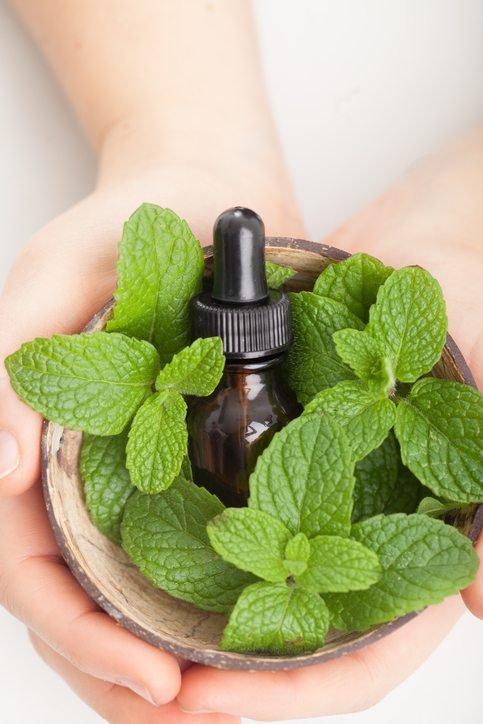
Peppermint oil capsules are derived from peppermint plants.
They are believed to help increase intestinal transit time by relaxing stomach muscles and increasing the flow of bile.
In a recent study, 35 volunteers with IBS received capsules containing peppermint oil and fiber, three times per day. A second group of 37 volunteers received a placebo pill that only contained fiber.
After 4 weeks, the peppermint oil group showed a 53.5% improvement in symptom scores for bloating and distention, compared to 28.1% improvement for the fiber-only group.
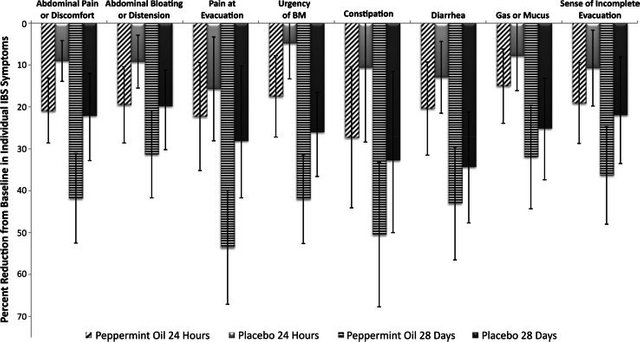
Comparison of change in IBS symptoms with peppermint oil capsules vs. placebo at 24 hours and 24 days. Higher score is better.
Note that placebo was also very powerful for reducing symptoms after one month, so it’s hard to say how useful peppermint itself is.
Additionally there was one study that found peppermint may slow intestinal transit time, which would worsen symptoms for certain people.
- Meditation

MeditationMeditation is the ancient spiritual practice of connecting the mind with the body.
It’s known to be an effective strategy for relieving psychological stress, which is loosely linked to bloating.
A small study of 13 IBS patients showed significant improvement in bloating with 15-minute meditation sessions, twice daily.
Study participants reported that the benefits continued at 3-month and 1-year follow-up visit.
Free instructional meditation podcasts are available here, and there are also free apps available such as Headspace and Calm.
Summary: Small studies suggest that peppermint oil and meditation may relieve bloating in some cases. These strategies are generally well-tolerated, but more research is needed regarding their effectiveness.
When to Call Your Doctor?
Bloating is usually not a serious medical issue, but there are circumstances that require further investigation.
See your doctor if you have frequent bloating with other symptoms, including diarrhea, constipation, fever, weight loss, poor appetite, or bloody stools.
Source: https://www.dietvsdisease.org/how-to-get-rid-of-bloating/
Copying/Pasting full texts without adding anything original is frowned upon by the community.
Some tips to share content and add value:
Repeated copy/paste posts could be considered spam. Spam is discouraged by the community, and may result in action from the cheetah bot.
Creative Commons: If you are posting content under a Creative Commons license, please attribute and link according to the specific license. If you are posting content under CC0 or Public Domain please consider noting that at the end of your post.
If you are actually the original author, please do reply to let us know!
Thank You!
Downvoting a post can decrease pending rewards and make it less visible. Common reasons:
Submit
This work is licensed under a Creative Commons Attribution 4.0 International License.
Downvoting a post can decrease pending rewards and make it less visible. Common reasons:
Submit
Should of stated that this is under Fair Use.
Copyright Disclaimer Under Section 107 of the Copyright Act 1976, allowance is made for "fair use" for purposes such as criticism, comment, news reporting, teaching, scholarship, and research. Fair use is a use permitted.
"Fair Use" guidelines: www.copyright.gov/fls/fl102.html
Downvoting a post can decrease pending rewards and make it less visible. Common reasons:
Submit
Worse feeling ever
Downvoting a post can decrease pending rewards and make it less visible. Common reasons:
Submit
Hi! I am a robot. I just upvoted you! I found similar content that readers might be interested in:
https://www.dietvsdisease.org/how-to-get-rid-of-bloating/
Downvoting a post can decrease pending rewards and make it less visible. Common reasons:
Submit
Excellent, informative post. Upvoted, followed you. Thanks for posting.
Downvoting a post can decrease pending rewards and make it less visible. Common reasons:
Submit
Hmm, this is a complete book.thanks for this great info
Downvoting a post can decrease pending rewards and make it less visible. Common reasons:
Submit